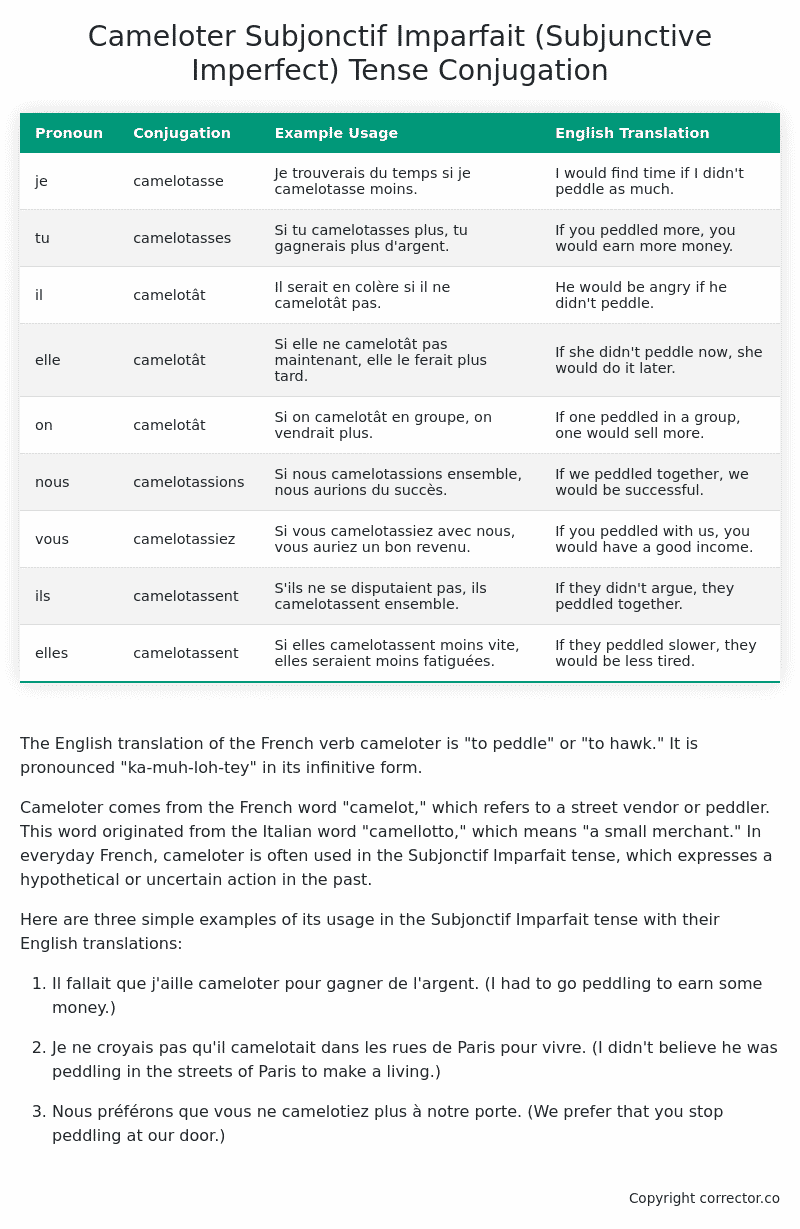Subjonctif Imparfait (Subjunctive Imperfect) Tense Conjugation of the French Verb cameloter
Introduction to the verb cameloter
The English translation of the French verb cameloter is “to peddle” or “to hawk.” It is pronounced “ka-muh-loh-tey” in its infinitive form.
Cameloter comes from the French word “camelot,” which refers to a street vendor or peddler. This word originated from the Italian word “camellotto,” which means “a small merchant.” In everyday French, cameloter is often used in the Subjonctif Imparfait tense, which expresses a hypothetical or uncertain action in the past.
Here are three simple examples of its usage in the Subjonctif Imparfait tense with their English translations:
-
Il fallait que j’aille cameloter pour gagner de l’argent. (I had to go peddling to earn some money.)
-
Je ne croyais pas qu’il camelotait dans les rues de Paris pour vivre. (I didn’t believe he was peddling in the streets of Paris to make a living.)
-
Nous préférons que vous ne camelotiez plus à notre porte. (We prefer that you stop peddling at our door.)
Table of the Subjonctif Imparfait (Subjunctive Imperfect) Tense Conjugation of cameloter
| Pronoun | Conjugation | Example Usage | English Translation |
|---|---|---|---|
| je | camelotasse | Je trouverais du temps si je camelotasse moins. | I would find time if I didn’t peddle as much. |
| tu | camelotasses | Si tu camelotasses plus, tu gagnerais plus d’argent. | If you peddled more, you would earn more money. |
| il | camelotât | Il serait en colère si il ne camelotât pas. | He would be angry if he didn’t peddle. |
| elle | camelotât | Si elle ne camelotât pas maintenant, elle le ferait plus tard. | If she didn’t peddle now, she would do it later. |
| on | camelotât | Si on camelotât en groupe, on vendrait plus. | If one peddled in a group, one would sell more. |
| nous | camelotassions | Si nous camelotassions ensemble, nous aurions du succès. | If we peddled together, we would be successful. |
| vous | camelotassiez | Si vous camelotassiez avec nous, vous auriez un bon revenu. | If you peddled with us, you would have a good income. |
| ils | camelotassent | S’ils ne se disputaient pas, ils camelotassent ensemble. | If they didn’t argue, they peddled together. |
| elles | camelotassent | Si elles camelotassent moins vite, elles seraient moins fatiguées. | If they peddled slower, they would be less tired. |
Other Conjugations for Cameloter.
Le Present (Present Tense) Conjugation of the French Verb cameloter
Imparfait (Imperfect) Tense Conjugation of the French Verb cameloter
Passé Simple (Simple Past) Tense Conjugation of the French Verb cameloter
Passé Composé (Present Perfect) Tense Conjugation of the French Verb cameloter
Futur Simple (Simple Future) Tense Conjugation of the French Verb cameloter
Futur Proche (Near Future) Tense Conjugation of the French Verb cameloter
Plus-que-parfait (Pluperfect) Tense Conjugation of the French Verb cameloter
Passé Antérieur (Past Anterior) Tense Conjugation of the French Verb cameloter
Futur Antérieur (Future Anterior) Tense Conjugation of the French Verb cameloter
Subjonctif Présent (Subjunctive Present) Tense Conjugation of the French Verb cameloter
Subjonctif Passé (Subjunctive Past) Tense Conjugation of the French Verb cameloter
Subjonctif Imparfait (Subjunctive Imperfect) Tense Conjugation of the French Verb cameloter (this article)
Subjonctif Plus-que-parfait (Subjunctive Pluperfect) Tense Conjugation of the French Verb cameloter
Conditionnel Présent (Conditional Present) Tense Conjugation of the French Verb cameloter
Conditionnel Passé (Conditional Past) Tense Conjugation of the French Verb cameloter
L’impératif Présent (Imperative Present) Tense Conjugation of the French Verb cameloter
L’infinitif Présent (Infinitive Present) Tense Conjugation of the French Verb cameloter
Struggling with French verbs or the language in general? Why not use our free French Grammar Checker – no registration required!
Get a FREE Download Study Sheet of this Conjugation 🔥
Simply right click the image below, click “save image” and get your free reference for the cameloter Subjonctif Imparfait tense conjugation!

Cameloter – About the French Subjonctif Imparfait (Subjunctive Imperfect) Tense
Formation
Common Everyday Usage Patterns
Interactions with Other Tenses
Subjonctif Présent
Indicatif Passé Composé
Conditional
Conditional Perfect
Summary
I hope you enjoyed this article on the verb cameloter. Still in a learning mood? Check out another TOTALLY random French verb conjugation!


